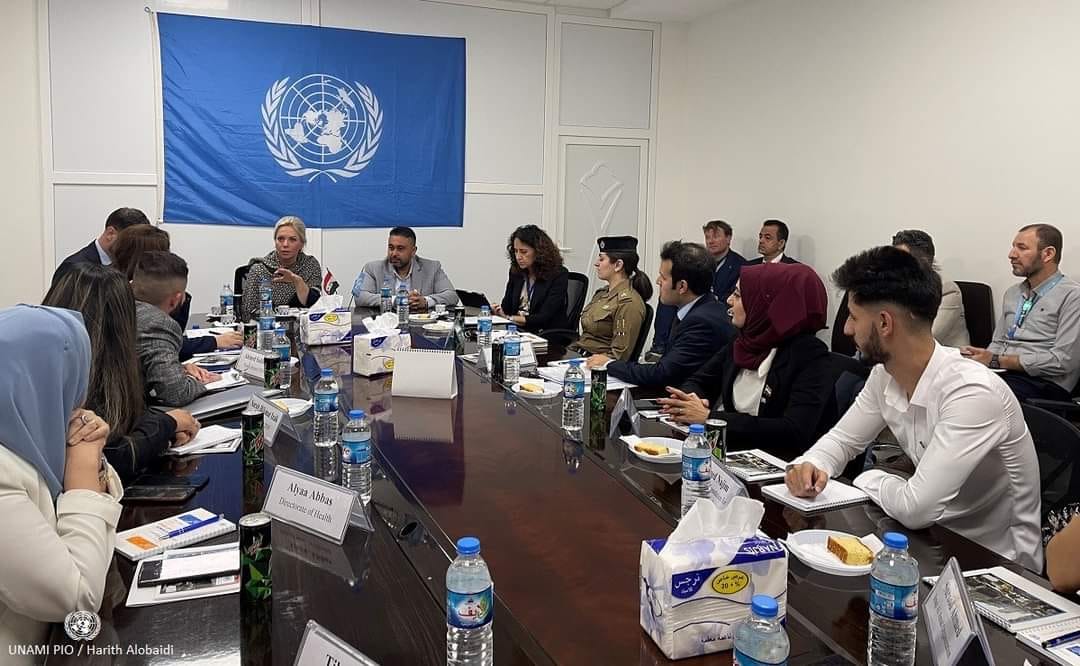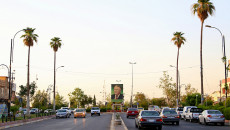Kirkuk women, youth and civil society representatives and activists shared their concerns with the Special Representative of the United Nations Secretary-General for Iraq SRSG and head of United Nations Assistance Mission for Iraq UNAMI, including the lack of oversight of the Kirkuk administration, the holding of provincial council elections, human rights and environmental issues.
On June 2nd, SRSG Jeanine Hennis-Plasschaert visited Kirkuk to discuss the situation of the province with the acting Governor, Rakan Al-Jubouri, and Lieutenant General Ali al-Fireji, Commander of Kirkuk’s Joint Operations’ Command JOC to hear about security developments.
Later, she met with women, youth and civil society representatives to discuss the basic and urgent needs of the public.
“We discussed the issue of utilities, human rights and the importance of active participation of the people in decision-making regarding the city's master plan," said Ismail Majid, director of Kokar Foundation for Sustainable Development.
"I called for the provincial council elections as soon as possible, because the council is the only bridge between the people and the government, especially in Kirkuk, because there is a distance between citizens and the government, due to the absence of the provincial council.
I called for the provincial council elections to be held as soon as possible
There have been no provincial council elections in Kirkuk since 2005, while the council was dissolved at the end of 2019 by the Iraqi parliament.
The northern oil-rich city of Kirkuk is home to about 1.7 million Kurds, Turkmens and Arabs. Located 238 kilometers north of Baghdad, Kirkuk is the center of the disputed territories between Baghdad and Erbil.
The Kurdish political parties were holding the senior admin and security positions of Kirkuk such as governor, head and deputy of the provincial council up to 2017 when the Iraqi government declared the defeat of the Islamic State ISIS and took over control in most of the disputed territories.
Back in October 2021 parliamentary elections, Kurds won 6 out of the 12 parliamentary seats of Kirkuk, four to Arabs, only two for the Turkmens and one quota seat for the Christians.
Currently, the Iraqi army, local and federal police, Brigade 61 of Special Forces along with Shiite paramilitary of Popular Mobilization Forces PMF, are under Kirkuk joint operations’ command, an umbrella for the security forces running the security of Kirkuk province.
Ismail stressed that the lack of communication between the people and the government, the reason why people resorted to demonstrations.
A day before the meeting, three separate demonstrations were held in Kirkuk for employment, services and job opportunities, disrupting traffic between Erbil and Kirkuk for several hours.
On Wednesday, June 1, a number of residents of villages belonging to the two subdistricts of Shiwan and Altun Kupri in Kirkuk, organized a large demonstration, and blocked Kirkuk-Erbil highway for hours against the continuous power outages in their areas as temperature is soaring up in the region.
“I talked about the environment and the increase in cancer,” Ismail added.
Through its five oil fields, Kirkuk pumps hundred thousand barrels of crude oil a day yet the province misses proper utilities of power supply, drinking water, garbage collection, and basic healthcare and education system badly hurt by corruption and long years of war and instability.
"Women should have a greater role in society and actively participate in decision-making," Hennis-Plasschaert said.
Women should have a bigger role in society and active participation in decision-making centers
"Plasschaert called on the participants and activists to continue to serve Kirkuk and promote the concept of democracy," Ismail said.
The Kirkuki activists called on the United Nations in Iraq to pay attention to the cultural and historical aspects of Kirkuk as the restoration of the Citadel and the historical monuments.
Activists and youth from all four ethnic groups participated in the meeting.
“The discussion was open; the participants were free to talk about whatever they wanted and Plasschaert only listened to them. The issue of children labor and rights was another topic of the meeting as one of the big challenges across Iraq,” said Sara Ishaq, a Christian civic activist
“Plasschaert had no specific recommendations,” Sarah Hikmat said.
The SRSG lately warned Iraqi politicians of the serious consequences the current deadlock following October 2021 General Elections might lead to.
"Iraqis continue to wait for a political class that, instead of being content with stale power battles, they are waiting for a political class that will roll up its sleeves to make headway on Iraq’s long list of outstanding domestic priorities," said Plasschaert while briefing the security council on May 17. "As you know, national elections took place well over seven months ago, and multiple deadlines for the formation of a government have been missed."
"Now, it is true, Iraq is not the only country facing a protracted government formation process. But Iraq’s political leaders would do well not to hide behind that argument. It distracts from what is at stake," she added.
"It excuses a political deadlock while non-state armed groups fire rockets with apparent freedom and impunity. It excuses a political stalemate while ordinary people suffer. It excuses a political impasse while simmering anger – public anger can boil over at any moments."






